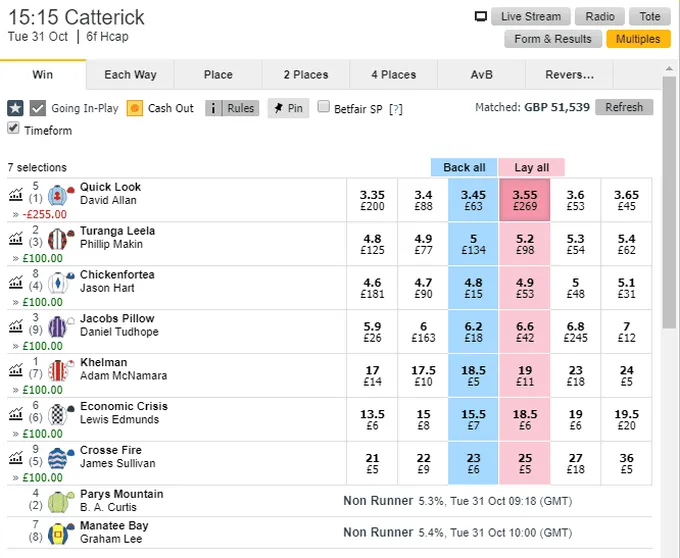What does lay mean in betting?:
A lay bet is the opposite of a traditional back bet – instead of betting on something to happen, you're betting on it NOT to happen. When you lay a bet, you're essentially acting as the bookmaker, taking the other side of someone else's wager on a betting exchange.
Why is understanding lay betting important for sports bettors?
- Opens up entirely new betting opportunities unavailable at traditional bookmakers.
- Allows you to profit when you're confident something won't happen rather than what will.
- Essential for advanced betting strategies like trading and matched betting.
Master the art of lay betting to unlock a whole new dimension of sports betting possibilities!
What is a lay bet? The complete definition
Right, let's get straight to the point – a lay bet is essentially betting against an outcome. While a traditional back bet means you're saying “this will happen,” a lay bet means you're saying “this definitely won't happen.” It's like being the bookmaker yourself, which is quite a shift from your usual punting perspective.
Think of it this way: if you back Manchester United to win at 2.0, you're confident they'll get the job done. But if you lay Manchester United at 2.0, you're confident they won't win, meaning you'll profit if they draw or lose. Simple as that, really.
Back bet vs lay bet explained
The fundamental difference between back and lay betting is all about what you're predicting will happen. Let's break it down with a proper example:
How does laying a bet work in practice?
When you place a lay bet, you're not just making a prediction – you're actually taking on the role of the bookmaker. This means you're accepting someone else's back bet and agreeing to pay them if their selection wins. It's quite a responsibility when you think about it!
Where can you place lay bets?
Here's the thing that catches many punters off guard – you can't place lay bets with your typical high street bookmakers like Bet365 or William Hill. They're simply not set up for it. Instead, you need to use a betting exchange.
- Betfair Exchange: The granddaddy of betting exchanges with the most liquidity.
- Smarkets: Lower commission rates but less market variety.
- Matchbook: Competitive commission structure for serious traders.
Important: Understanding betting exchange mechanics
On betting exchanges, you're not betting against the house; you're betting against other punters. This means there needs to be someone willing to back what you're laying, and vice versa. It's like a marketplace where bets get matched between users.
As you are betting against other customers, there must be enough money in the market for your bet to be paid out, before you place it. This is called liquidity and it applies to both back and lay bets on a betting exchange.
When placing your bet on a betting exchange, the liquidity will be displayed alongside the odds.
For example, the image above shows a horse race at Catterick.
Key elements visible:
- The Odds Columns (3.35, 3.4, 3.45, etc.) – These show the different price points where you can place bets
- The Money Amounts (£200, £88, £63, etc.) – These numbers beneath each odds represent the liquidity – the actual amount of money available to bet at those specific odds
Colour coding:
- Blue boxes (Back) – Money available for backing horses (betting on them to win)
- Pink boxes (Lay) – Money available for laying horses (betting against them winning)
What this Shows about Liquidity:
For example, looking at “Quick Look” (top horse):
- You can back it at 3.45 odds with up to £63 available
- You can lay it at 3.55 odds with up to £269 available
The practical meaning: If you wanted to back Quick Look for more than £63 at 3.45 odds, your bet wouldn't be fully matched at that price – you'd either get partial matching or need to accept worse odds.
Understanding liability in lay betting
Now, this is where lay betting gets a bit more serious. When you place a lay bet, you need to have enough funds in your account to cover what's called your “liability” – that's the amount you'll need to pay out if your lay bet loses.
Calculating your liability
The liability calculation is straightforward: Liability = Lay stake × (Lay odds – 1)
Let's say you want to lay Tottenham to win at odds of 3.0 with a £20 stake:
- Your potential profit: £20 (if Tottenham don't win).
- Your potential loss: £20 × (3.0 – 1) = £40 (if Tottenham win).
- Required liability: £40.
💡Expert tips: Always check your liability before placing lay bets. The exchange will show you exactly how much you need in your account, but it's good practice to calculate it yourself to avoid any nasty surprises.
Practical examples of lay betting
Football lay betting example
Imagine Chelsea are playing Brighton, and you reckon Chelsea are overpriced favourites at 1.5. Rather than backing Brighton or the draw separately, you could simply lay Chelsea. If the match ends in a draw or Brighton win, your lay bet comes in. It's like covering two outcomes with one bet.
Horse racing lay betting example
Picture this: There's a 10-horse race at Cheltenham, and the favourite is priced at 2.5, but you think it's got no chance based on the going conditions. Instead of trying to pick which of the other nine horses will win, you just lay the favourite. If any of the other nine win, you're in the clear.
Key advantages and disadvantages of lay betting
Common lay betting terminology
- Liquidity: The amount of money available to bet at specific odds.
- Matched bet: When your lay bet finds a corresponding back bet.
- Unmatched bet: A lay bet waiting for someone to back the same selection.
- Commission: The small percentage the exchange takes from your net winnings.
- Liability: The maximum amount you could lose on your lay bet.
Beginner's warning
Don't dive straight into lay betting without understanding the mechanics. Start small, practice with low-stakes bets, and always double-check your liability before confirming any lay bet. The potential losses can be significantly higher than your stake.
Quiz – Test your knowledge about lay betting
1. What happens when you lay a football team to win?
Answer: You win if that team draws or loses the match.
2. Where can you place lay bets?
Answer: Only on betting exchanges like Betfair, not with traditional bookmakers.
3. If you lay a horse at 4.0 with a £10 stake, what's your liability?
Answer: £30 (£10 × (4.0 – 1) = £30)
4. What's the maximum you can win on a lay bet?
Answer: Your lay stake (the other person's stake that you're taking on).
5. What's liquidity in betting exchange terms?
Answer: The amount of money available to bet at specific odds.






















































 GambleAware
GambleAware